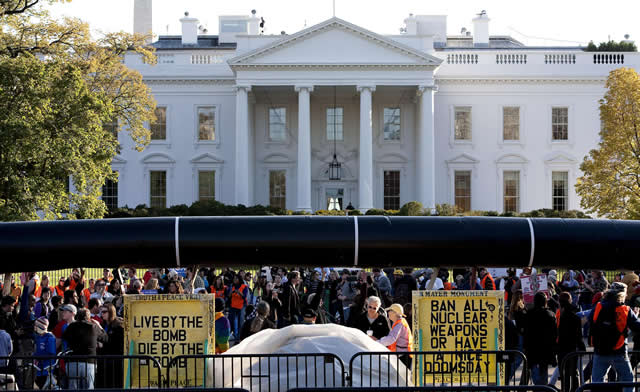
Demonstrators carry a giant mock pipeline while calling for the cancellation of the Keystone XL pipeline during a rally in front of the White House in Washington November 6, 2011.
The Obama Administration announced it would delay the construction of the $7 billion Keystone XL pipeline that would bring in more than 700,000 barrels of oil per day from Alberta, Canada, to the Texas Gulf coast.
What this delay really means is that President Obama is putting off an important election year decision in which two of his largest supporters—labor unions and environmentalists—are split on the issue. This tactic allows the decision to be delayed until after the 2012 elections.
More importantly, this means a delay in access to easy imports from our northern neighbor, the creation of thousands of jobs, and the generation of revenue for the states where the pipeline passes. Montana, South Dakota, Kansas, Oklahoma, Nebraska, and Texas are collectively projected to collect $5.2 billion in property tax revenue as a result of building the pipeline.
Radical environmentalists act as if this is the first oil pipeline being built in the United States. We have 50,000 miles of oil pipeline in this country that have provided massive economic benefits with minimal environmental harm. In short, building the Keystone XL pipeline is nothing new, and it’s one of the most environmentally sensible ways to transport oil. Even the Obama Administration determined it to be safe when the State Department’s recent Environmental Impact Statement found that the pipeline would pose few environmental risks.
If the oil doesn’t come into the U.S., it’s going to have to travel further to go elsewhere, which increases the risk of environmental harm. The oil isn’t going to stay in the ground. As my colleague David Kreutzer writes:
Let’s acknowledge that blocking the XL pipeline won’t stop development of the oil sands. It will slow some of the development, which will increase the world price of petroleum. However, the major impact of blocking the pipeline would be a significant diversion of the oil to non-U.S. consumers.
So, block the XL pipeline if you think the environment will be better served by shipping Canadian oil an extra 6,000 miles across the Pacific in oil-consuming super tankers and then refining it in less-regulated Chinese refineries. In addition, be aware that replacing the Canadian oil means the U.S. also must import more oil by tankers, which are less efficient than pipelines.”
For President Obama, delaying the Keystone XL pipeline decision may be a smart political move. But for a country struggling to create jobs and meet energy demands, it’s not a smart economic decision.


























